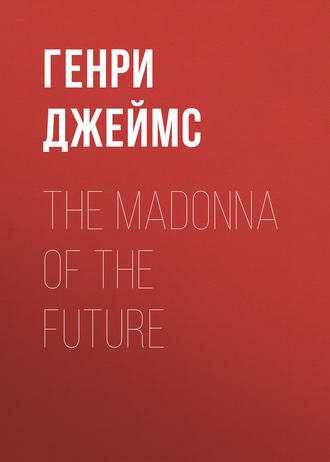
Генри Джеймс
The Madonna of the Future
The gallery of the Uffizi is not only rich in its possessions, but peculiarly fortunate in that fine architectural accident, as one may call it, which unites it—with the breadth of river and city between them—to those princely chambers of the Pitti Palace. The Louvre and the Vatican hardly give you such a sense of sustained inclosure as those long passages projected over street and stream to establish a sort of inviolate transition between the two palaces of art. We passed along the gallery in which those precious drawings by eminent hands hang chaste and gray above the swirl and murmur of the yellow Arno, and reached the ducal saloons of the Pitti. Ducal as they are, it must be confessed that they are imperfect as show-rooms, and that, with their deep-set windows and their massive mouldings, it is rather a broken light that reaches the pictured walls. But here the masterpieces hang thick, and you seem to see them in a luminous atmosphere of their own. And the great saloons, with their superb dim ceilings, their outer wall in splendid shadow, and the sombre opposite glow of mellow canvas and dusky gilding, make, themselves, almost as fine a picture as the Titians and Raphaels they imperfectly reveal. We lingered briefly before many a Raphael and Titian; but I saw my friend was impatient, and I suffered him at last to lead me directly to the goal of our journey—the most tenderly fair of Raphael’s virgins, the Madonna in the Chair. Of all the fine pictures of the world, it seemed to me this is the one with which criticism has least to do. None betrays less effort, less of the mechanism of success and of the irrepressible discord between conception and result, which shows dimly in so many consummate works. Graceful, human, near to our sympathies as it is, it has nothing of manner, of method, nothing, almost, of style; it blooms there in rounded softness, as instinct with harmony as if it were an immediate exhalation of genius. The figure melts away the spectator’s mind into a sort of passionate tenderness which he knows not whether he has given to heavenly purity or to earthly charm. He is intoxicated with the fragrance of the tenderest blossom of maternity that ever bloomed on earth.
“That’s what I call a fine picture,” said my companion, after we had gazed a while in silence. “I have a right to say so, for I have copied it so often and so carefully that I could repeat it now with my eyes shut. Other works are of Raphael: this is Raphael himself. Others you can praise, you can qualify, you can measure, explain, account for: this you can only love and admire. I don’t know in what seeming he walked among men while this divine mood was upon him; but after it, surely, he could do nothing but die; this world had nothing more to teach him. Think of it a while, my friend, and you will admit that I am not raving. Think of his seeing that spotless image, not for a moment, for a day, in a happy dream, or a restless fever-fit; not as a poet in a five minutes’ frenzy—time to snatch his phrase and scribble his immortal stanza; but for days together, while the slow labour of the brush went on, while the foul vapours of life interposed, and the fancy ached with tension, fixed, radiant, distinct, as we see it now! What a master, certainly! But ah! what a seer!”
“Don’t you imagine,” I answered, “that he had a model, and that some pretty young woman—”
“As pretty a young woman as you please! It doesn’t diminish the miracle! He took his hint, of course, and the young woman, possibly, sat smiling before his canvas. But, meanwhile, the painter’s idea had taken wings. No lovely human outline could charm it to vulgar fact. He saw the fair form made perfect; he rose to the vision without tremor, without effort of wing; he communed with it face to face, and resolved into finer and lovelier truth the purity which completes it as the fragrance completes the rose. That’s what they call idealism; the word’s vastly abused, but the thing is good. It’s my own creed, at any rate. Lovely Madonna, model at once and muse, I call you to witness that I too am an idealist!”
“An idealist, then,” I said, half jocosely, wishing to provoke him to further utterance, “is a gentleman who says to Nature in the person of a beautiful girl, ‘Go to, you are all wrong! Your fine is coarse, your bright is dim, your grace is gaucherie. This is the way you should have done it!’ Is not the chance against him?”
He turned upon me almost angrily, but perceiving the genial savour of my sarcasm, he smiled gravely. “Look at that picture,” he said, “and cease your irreverent mockery! Idealism is that! There’s no explaining it; one must feel the flame! It says nothing to Nature, or to any beautiful girl, that they will not both forgive! It says to the fair woman, ‘Accept me as your artist friend, lend me your beautiful face, trust me, help me, and your eyes shall be half my masterpiece!’ No one so loves and respects the rich realities of nature as the artist whose imagination caresses and flatters them. He knows what a fact may hold (whether Raphael knew, you may judge by his portrait, behind us there, of Tommaso Inghirami); bad his fancy hovers above it, as Ariel hovered above the sleeping prince. There is only one Raphael, bad an artist may still be an artist. As I said last night, the days of illumination are gone; visions are rare; we have to look long to see them. But in meditation we may still cultivate the ideal; round it, smooth it, perfect it. The result—the result,” (here his voice faltered suddenly, and he fixed his eyes for a moment on the picture; when they met my own again they were full of tears)—“the result may be less than this; but still it may be good, it may be great!” he cried with vehemence. “It may hang somewhere, in after years, in goodly company, and keep the artist’s memory warm. Think of being known to mankind after some such fashion as this! of hanging here through the slow centuries in the gaze of an altered world; living on and on in the cunning of an eye and hand that are part of the dust of ages, a delight and a law to remote generations; making beauty a force and purity an example!”
“Heaven forbid,” I said, smiling, “that I should take the wind out of your sails! But doesn’t it occur to you that, besides being strong in his genius, Raphael was happy in a certain good faith of which we have lost the trick? There are people, I know, who deny that his spotless Madonnas are anything more than pretty blondes of that period enhanced by the Raphaelesque touch, which they declare is a profane touch. Be that as it may, people’s religious and æsthetic needs went arm in arm, and there was, as I may say, a demand for the Blessed Virgin, visible and adorable, which must have given firmness to the artist’s hand. I am afraid there is no demand now.”
My companion seemed painfully puzzled; he shivered, as it were, in this chilling blast of scepticism. Then shaking his head with sublime confidence—“There is always a demand!” he cried; “that ineffable type is one of the eternal needs of man’s heart; but pious souls long for it in silence, almost in shame. Let it appear, and their faith grows brave. How should it appear in this corrupt generation? It cannot be made to order. It could, indeed, when the order came, trumpet-toned, from the lips of the Church herself, and was addressed to genius panting with inspiration. But it can spring now only from the soil of passionate labour and culture. Do you really fancy that while, from time to time, a man of complete artistic vision is born into the world, that image can perish? The man who paints it has painted everything. The subject admits of every perfection—form, colour, expression, composition. It can be as simple as you please, and yet as rich; as broad and pure, and yet as full of delicate detail. Think of the chance for flesh in the little naked, nestling child, irradiating divinity; of the chance for drapery in the chaste and ample garment of the mother! think of the great story you compress into that simple theme! Think, above all, of the mother’s face and its ineffable suggestiveness, of the mingled burden of joy and trouble, the tenderness turned to worship, and the worship turned to far-seeing pity! Then look at it all in perfect line and lovely colour, breathing truth and beauty and mastery!”
“Anch’ io son pittore!” I cried. “Unless I am mistaken, you have a masterpiece on the stocks. If you put all that in, you will do more than Raphael himself did. Let me know when your picture is finished, and wherever in the wide world I may be, I will post back to Florence and pay my respects to—the Madonna of the future!”
He blushed vividly and gave a heavy sigh, half of protest, half of resignation. “I don’t often mention my picture by name. I detest this modern custom of premature publicity. A great work needs silence, privacy, mystery even. And then, do you know, people are so cruel, so frivolous, so unable to imagine a man’s wishing to paint a Madonna at this time of day, that I have been laughed at—laughed at, sir!” and his blush deepened to crimson. “I don’t know what has prompted me to be so frank and trustful with you. You look as if you wouldn’t laugh at me. My dear young man”—and he laid his hand on my arm—“I am worthy of respect. Whatever my talents may be, I am honest. There is nothing grotesque in a pure ambition, or in a life devoted to it.”
There was something so sternly sincere in his look and tone that further questions seemed impertinent. I had repeated opportunity to ask them, however, for after this we spent much time together. Daily for a fortnight, we met by appointment, to see the sights. He knew the city so well, he had strolled and lounged so often through its streets and churches and galleries, he was so deeply versed in its greater and lesser memories, so imbued with the local genius, that he was an altogether ideal valet de place, and I was glad enough to leave my Murray at home, and gather facts and opinions alike from his gossiping commentary. He talked of Florence like a lover, and admitted that it was a very old affair; he had lost his heart to her at first sight. “It’s the fashion to talk of all cities as feminine,” he said, “but, as a rule, it’s a monstrous mistake. Is Florence of the same sex as New York, as Chicago? She is the sole perfect lady of them all; one feels towards her as a lad in his teens feels to some beautiful older woman with a ‘history.’ She fills you with a sort of aspiring gallantry.” This disinterested passion seemed to stand my friend in stead of the common social ties; he led a lonely life, and cared for nothing but his work. I was duly flattered by his having taken my frivolous self into his favour, and by his generous sacrifice of precious hours to my society. We spent many of these hours among those early paintings in which Florence is so rich, returning ever and anon, with restless sympathies, to wonder whether these tender blossoms of art had not a vital fragrance and savour more precious than the full-fruited knowledge of the later works. We lingered often in the sepulchral chapel of San Lorenzo, and watched Michael Angelo’s dim-visaged warrior sitting there like some awful Genius of Doubt and brooding behind his eternal mask upon the mysteries of life. We stood more than once in the little convent chambers where Fra Angelico wrought as if an angel indeed had held his hand, and gathered that sense of scattered dews and early bird-notes which makes an hour among his relics seem like a morning stroll in some monkish garden. We did all this and much more—wandered into dark chapels, damp courts, and dusty palace-rooms, in quest of lingering hints of fresco and lurking treasures of carving.
I was more and more impressed with my companion’s remarkable singleness of purpose. Everything was a pretext for some wildly idealistic rhapsody or reverie. Nothing could be seen or said that did not lead him sooner or later to a glowing discourse on the true, the beautiful, and the good. If my friend was not a genius, he was certainly a monomaniac; and I found as great a fascination in watching the odd lights and shades of his character as if he had been a creature from another planet. He seemed, indeed, to know very little of this one, and lived and moved altogether in his own little province of art. A creature more unsullied by the world it is impossible to conceive, and I often thought it a flaw in his artistic character that he had not a harmless vice or two. It amused me greatly at times to think that he was of our shrewd Yankee race; but, after all, there could be no better token of his American origin than this high æsthetic fever. The very heat of his devotion was a sign of conversion; those born to European opportunity manage better to reconcile enthusiasm with comfort. He had, moreover, all our native mistrust for intellectual discretion, and our native relish for sonorous superlatives. As a critic he was very much more generous than just, and his mildest terms of approbation were “stupendous,” “transcendent,” and “incomparable.” The small change of admiration seemed to him no coin for a gentleman to handle; and yet, frank as he was intellectually, he was personally altogether a mystery. His professions, somehow, were all half-professions, and his allusions to his work and circumstances left something dimly ambiguous in the background. He was modest and proud, and never spoke of his domestic matters. He was evidently poor; yet he must have had some slender independence, since he could afford to make so merry over the fact that his culture of ideal beauty had never brought him a penny. His poverty, I supposed, was his motive for neither inviting me to his lodging nor mentioning its whereabouts. We met either in some public place or at my hotel, where I entertained him as freely as I might without appearing to be prompted by charity. He seemed always hungry, and this was his nearest approach to human grossness. I made a point of asking no impertinent questions, but, each time we met, I ventured to make some respectful allusion to the magnum opus, to inquire, as it were, as to its health and progress. “We are getting on, with the Lord’s help,” he would say, with a grave smile. “We are doing well. You see, I have the grand advantage that I lose no time. These hours I spend with you are pure profit. They are suggestive! Just as the truly religious soul is always at worship, the genuine artist is always in labour. He takes his property wherever he finds it, and learns some precious secret from every object that stands up in the light. If you but knew the rapture of observation! I gather with every glance some hint for light, for colour, or relief! When I get home, I pour out my treasures into the lap of toy Madonna. Oh, I am not idle! Nulla dies sine linea.”
I was introduced in Florence to an American lady whose drawing-room had long formed an attractive place of reunion for the foreign residents. She lived on a fourth floor, and she was not rich; but she offered her visitors very good tea, little cakes at option, and conversation not quite to match. Her conversation had mainly an æsthetic flavour, for Mrs. Coventry was famously “artistic.” Her apartment was a sort of Pitti Palace au petit pied. She possessed “early masters” by the dozen—a cluster of Peruginos in her dining-room, a Giotto in her boudoir, an Andrea del Sarto over her drawing-room chimney-piece. Surrounded by these treasures, and by innumerable bronzes, mosaics, majolica dishes, and little worm-eaten diptychs covered with angular saints on gilded backgrounds, our hostess enjoyed the dignity of a sort of high-priestess of the arts. She always wore on her bosom a huge miniature copy of the Madonna della Seggiola. Gaining her ear quietly one evening, I asked her whether she knew that remarkable man, Mr. Theobald.






